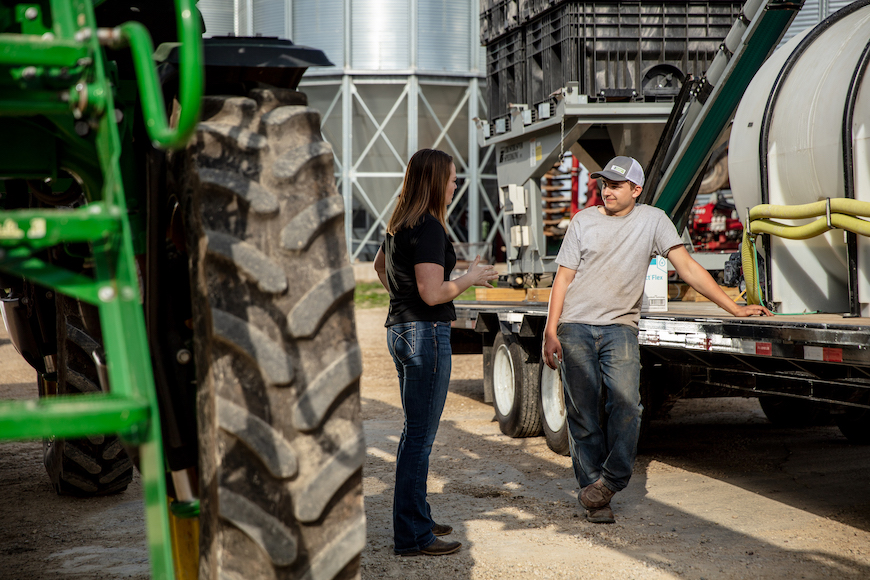Jan 07, 2025
Design Your Corn Acres Using Response-to Fungicide Scores
Randy Mette
Seed Product Manager

Are you thinking about your fungicide plan when choosing which hybrids to plant? Neglecting to consider how a hybrid responds to fungicide could be keeping you from valuable yield enhancement opportunities.
Response-to fungicide (RTF) scores should be considered from the very beginning of your crop year planning, not just referenced come June or July when you’re deciding whether or not to spray.
RTF scores are a simple and straightforward tool, but they have robust data backing them up. There are three ratings: high, moderate and low. High-RTF hybrids respond greatly to fungicide applications, typically indicating an opportunity for the greatest return on fungicide investment. Low responders see the lowest response when a fungicide application is made.
Here’s how RTF scores can help you design a more successful corn acre.
On the other hand, easily accessible fields could be well-suited for a high-RTF hybrid and a fungicide application could help unlock top-end yield potential. When selecting corn products for the coming season, think about field accessibility and what applications are realistic in mid to late summer.
They can also be combined with other response-to scores, such as response-to nitrogen (RTN) to help you prioritize further. For example, CP4079VT2P has a high RTF score but moderate RTN score, which is an indicator to prioritize fungicide applications.
However, a hybrid like CP4676SS has a high RTN score but moderate RTF score. In this scenario, I recommend prioritizing nitrogen rates and availability throughout the growing season to ensure nitrogen is not a limiting factor prior to making a fungicide application. If yield is compromised due to insufficient nitrogen availability, ROI from a fungicide application may not be maximized.
If RTP is high, for example, stalk integrity may be something to watch out for later in the season. However, choosing a hybrid with a high RTF score like CP2845SS could help solve the potential issue as fungicide applications help maintain stalk integrity later into the harvest season.
As you push populations higher, crop biomass becomes more dense, potentially leading to increased humidity levels and decreased air flow. Combined, these conditions have the potential for a higher disease load within the crop canopy, making it critical to understand RTF scores by hybrid to maximize yield and ROI potential.
While RTF, RTN and RTP scores are available for every CROPLAN hybrid on their product page, your local ag input retailer has access to even more response-to research. They can help you decipher the data, place products where they’ll best succeed and get you set up with the products you’ll need early.
All photos are either the property of WinField United or used with permission.
© 2025 WinField United. Important: Before use always read and follow label instructions. Crop performance is dependent on several factors many of which are beyond the control of WinField United, including without limitation, soil type, pest pressures, agronomic practices and weather conditions. Growers are encouraged to consider data from multiple locations, over multiple years and to be mindful of how such agronomic conditions could impact results. Answer Plot, CROPLAN and WinField are trademarks of WinField United. All other trademarks are the property of their respective owners.
Response-to fungicide (RTF) scores should be considered from the very beginning of your crop year planning, not just referenced come June or July when you’re deciding whether or not to spray.
RTF scores are a simple and straightforward tool, but they have robust data backing them up. There are three ratings: high, moderate and low. High-RTF hybrids respond greatly to fungicide applications, typically indicating an opportunity for the greatest return on fungicide investment. Low responders see the lowest response when a fungicide application is made.
Here’s how RTF scores can help you design a more successful corn acre.
Inform Product Placement
Certain fields are more conducive to fungicide applications than others. Some field shapes and locations make it difficult for an airplane, drone, or ground rig to get across at the ideal fungicide timing. In these situations, I would consider hybrids with a low to moderate RTF hybrid.On the other hand, easily accessible fields could be well-suited for a high-RTF hybrid and a fungicide application could help unlock top-end yield potential. When selecting corn products for the coming season, think about field accessibility and what applications are realistic in mid to late summer.
Prioritize Your Crop Input Investments
While fungicide has many proven benefits to crop performance, spraying every acre every year may not always deliver the largest return on investment. RTF scores can help you identify which products to prioritize for maximum ROI potential.They can also be combined with other response-to scores, such as response-to nitrogen (RTN) to help you prioritize further. For example, CP4079VT2P has a high RTF score but moderate RTN score, which is an indicator to prioritize fungicide applications.
However, a hybrid like CP4676SS has a high RTN score but moderate RTF score. In this scenario, I recommend prioritizing nitrogen rates and availability throughout the growing season to ensure nitrogen is not a limiting factor prior to making a fungicide application. If yield is compromised due to insufficient nitrogen availability, ROI from a fungicide application may not be maximized.
Inform Population Density Decisions
RTF scores can also be combined with response-to population (RTP) scores to help predict late-season standability. As plant populations increase, stalk diameter may decrease slightly which could lead to weaker stalks late in the season on given hybrids.If RTP is high, for example, stalk integrity may be something to watch out for later in the season. However, choosing a hybrid with a high RTF score like CP2845SS could help solve the potential issue as fungicide applications help maintain stalk integrity later into the harvest season.
As you push populations higher, crop biomass becomes more dense, potentially leading to increased humidity levels and decreased air flow. Combined, these conditions have the potential for a higher disease load within the crop canopy, making it critical to understand RTF scores by hybrid to maximize yield and ROI potential.
Set Yourself Up For More Predictable Outcomes
RTF scores are based on randomized, replicated research trials conducted in various environments. We’ve done the trial and error at our Answer Plot® locations, rigorously vetted the results and done the data analysis so you can rely on these scores to indicate more predictable outcomes from your CROPLAN® selections.Lock In Plans and Product Early
Knowing which hybrids are most likely to give you the highest ROI potential can also help you plan ahead, lock in the best fungicide prices and ensure supply. Rather than waiting until mid-summer, make your fungicide plan for as many fields as possible before the growing season even begins.While RTF, RTN and RTP scores are available for every CROPLAN hybrid on their product page, your local ag input retailer has access to even more response-to research. They can help you decipher the data, place products where they’ll best succeed and get you set up with the products you’ll need early.
All photos are either the property of WinField United or used with permission.
© 2025 WinField United. Important: Before use always read and follow label instructions. Crop performance is dependent on several factors many of which are beyond the control of WinField United, including without limitation, soil type, pest pressures, agronomic practices and weather conditions. Growers are encouraged to consider data from multiple locations, over multiple years and to be mindful of how such agronomic conditions could impact results. Answer Plot, CROPLAN and WinField are trademarks of WinField United. All other trademarks are the property of their respective owners.
IF YOU LOVE OUR INSIGHT, YOU’LL LOVE OUR ROI POTENTIAL
Every successful harvest starts with a seed. It just can't end there. Choose which high-performing seed products you’ll start with this season.




